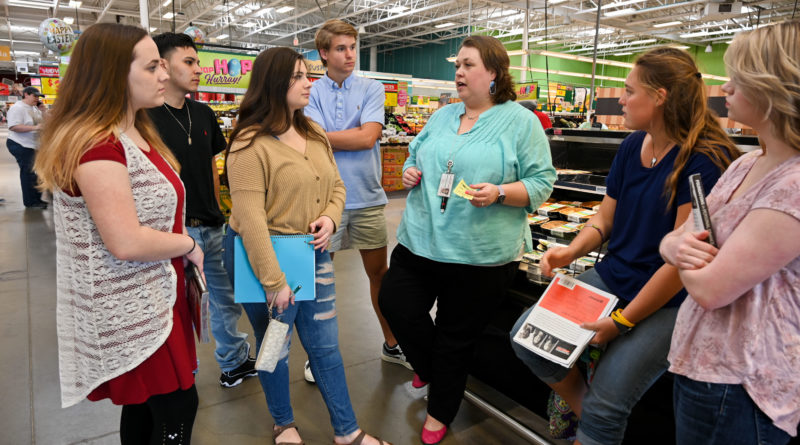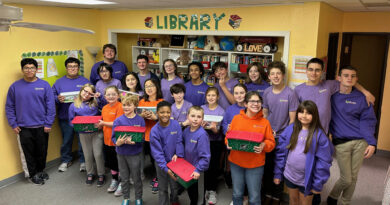Show Them the Money
Amanda Simpson Teaches Real-Life Skills to Students
By STACY MOSER | Photography by NAN DICKSON
When you think about the word literacy, it typically refers to the effort to read and write with competence. But Belton High School teacher Amanda Simpson hears the word differently. To her, literacy describes the effort to lead a healthy financial life.

Amanda studied accounting at Texas Tech University and says she learned right away how finances could literally change lives for better or for worse. She decided she wanted to help people learn to budget, get out of debt—and to become financially literate.
She graduated with a degree in family financial planning and landed a job in the nonprofit financial counseling sector, where she helped clients of all socio-economic backgrounds climb out of financial trouble, showing them how to pursue goals and develop smart habits.
“I was drawn to the personal side of financial planning,” she says. “To me, the ability to help people who were in crisis was really rewarding. I kept hearing from clients, ‘I wish I had learned this sooner.’ That’s when I decided to take my passion for financial literacy to the classroom.”
After teaching high-school business classes in Pflugerville for eight years, she and her husband relocated to Temple in 2015 to be closer to his work. Amanda was hired to teach accounting at Belton High School and, to her delight, she was assigned to teach a class that had been adopted by the State of Texas in 2010, Money Matters.
“In Money Matters, we use the Foundations in Personal Finance curriculum written by best-selling author and radio-show host Dave Ramsey. We cover students’ relationship with money—why they should plan, save, budget, learn the basics of banking. I show them why it’s important to balance a checking account, be aware of the trap of debt, use credit wisely. I give real-world examples, like buying a house or a car, watching out for identity theft, how to pay for college, investing. It’s not too soon for them to learn about retirement, taxes and insurance. Their relationship with money—understanding their own ‘money personality,’ how it affects a marriage, choosing a career path and the importance of giving back is crucial to their financial success later in life.”
“No one sets out to make bad choices. My goal is to arm students with financial information now so they can make smart choices—without having to learn the hard way through trial and error.”
One of Amanda’s students, Michael Estrada, talks about what the Money Matters class has meant to him, “It has affected me deeply. I thank God for this class because, without it, I wouldn’t know how to be protected financially. Now I know how to save and spend on my ‘needs’ instead of my ‘wants.’”

Another student, Aubree Kasten, says, “I learned that it’s not how much money you invest, but when you start investing. Now I assign every dollar a purpose, so I don’t spend money unnecessarily.”
Amanda feels strongly that financial education must become mandatory for all students. “Right now, this type of class is not required for graduation in the State of Texas. I’ve always believed it should. Before people can drive, they must take a driver’s education course and get a license. No course or license is required before someone begins using money. These kids’ decisions about how they handle money can drastically affect their future. No matter what profession or path they choose, they need to know the basics about personal finance.”
The Lighter Side of Finances—A Youthful Perspective
“My first year teaching, I was leading a class of freshmen in a project about a car purchase. When discussing a used car’s mileage, one of my students announced that the higher the mileage a car had, the better. When I asked why she thought that, she explained—as you drive the car, the miles count down (descending on the odometer). When the mileage gets to zero, you need a new car.” — Amanda Simpson
Amanda’s Advice for Teens
- Start saving NOW—consistently and with purpose. Even a small amount socked away each month develops a good habit. Compound interest is a powerful tool at your age! Get a short-term liquid savings account for emergencies and an investment account for long-term savings.
- Interest can work against you. Don’t fall into the debt trap. You’ll be bombarded with offers to take out credit cards, but purchasing with debt can lead to overspending. If you can’t afford to pay cash for an item now, you can’t afford to pay for the item plus interest later.
- Control your money so it doesn’t control you. Keep track of where and why you spend money. Beware of impulse spending. You work hard for your money—be aware of where it goes.
Want to Learn More?
- Project Groundswell: A national, grassroots effort to push for more financial education in schools. Visit CheckYourSchool.org
- Read “The Millionaire Next Door: The Surprising Secrets of America’s Wealthy,” Thomas J. Stanley & William Danko, (Taylor Trade Publishing, 2010). “Contrary to what most people think of the stereotypical millionaire, most of them are frugal people next door who don’t live lavishly. This book shares the habits of everyday millionaires so we can learn by example.”
 Kadyn Utley—Star Student
Kadyn Utley—Star Student
One of Amanda Simpson’s star students, Belton High School graduate Kadyn Utley, consistently earned recognition through the University Interscholastic League (UIL) and Business Professionals of America (BPA) competitions at the district, regional, state and even national levels.
“In those accounting competitions, individuals take a test evaluating them on accounting concepts and applying their knowledge to case studies. Kadyn’s accomplishments are an example of determination, hard work and persistence,” Amanda says proudly.
Of his former teacher, Kadyn says, “Mrs. Simpson makes an exceptional effort to be the best at her job and to mentor students and peers. With her help, I found the career I want to pursue.” Kadyn recently completed his freshman year as a business major at Texas A&M–College Station.




